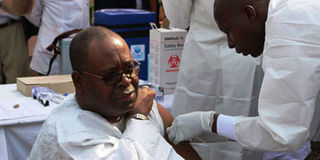WHO declares Ebola outbreak eradicated

A man gets vaccinated on March 10, 2015 at a health center in Conakry, Guinea, during the first clinical trials of the VSV-EBOV vaccine against the Ebola virus. At its peak, it devastated Guinea, Liberia and Sierra Leone, with bodies piling up in the streets and overwhelmed hospitals recording hundreds of new cases a week. PHOTO | AFP
What you need to know:
- The deadliest outbreak in the history of the feared tropical virus wrecked the economies and health systems of the three worst-hit west African nations after it emerged in southern Guinea in December 2013.
- Liberia, the country worst hit by the outbreak with 4,800 deaths, discharged its last two patients from hospital — the father and younger brother of a 15-year-old victim — on December 3, 2015.
MONROVIA
The world breathed a sigh of relief Thursday as a two-year Ebola epidemic that killed 11,000 and triggered a global health alert was declared over, with Liberia the last country to get the all-clear.
The deadliest outbreak in the history of the feared tropical virus wrecked the economies and health systems of the three worst-hit west African nations after it emerged in southern Guinea in December 2013.
At its peak, it devastated Guinea, Liberia and Sierra Leone, with bodies piling up in the streets and overwhelmed hospitals recording hundreds of new cases a week.
“Today the World Health Organization (WHO) declares the end of the most recent outbreak of Ebola virus disease in Liberia and says all known chains of transmission have been stopped in west Africa,” the UN health agency announced on Liberian state radio.
UN chief Ban Ki-moon warned the region can expect sporadic cases in the coming year but added “we also expect the potential and frequency of those flare-ups to decrease over time”.
Rick Brennan, WHO chief of emergency risk management and humanitarian response, hailed an important milestone but told reporters in Geneva that “the job is still not done”, pointing out that there had already been 10 small flare-ups because of the persistence of the virus in survivors.
Reaction to the announcement was muted in Monrovia, where locals have become accustomed to good news on Ebola being followed by setbacks, and there was no official programme of celebration.
“We are happy to hear that Liberia is once more Ebola-free. At least now we know that our health workers are up to the task as they are no longer giving the virus a chance to spread,” said teacher Abenigo Kollie, 45.
“As educators we will continue to tell our students to remain vigilant.” Aminata Kanneh, a 32-year-old entrepreneur, told AFP people were “no longer afraid” because recent flare-ups were dealt with quickly.
“The pronouncement today is a joy but does not call for celebration because we may experience another outbreak,” she said.
Liberia, the country worst hit by the outbreak with 4,800 deaths, discharged its last two patients from hospital — the father and younger brother of a 15-year-old victim — on December 3, 2015.
Africa’s oldest republic was the last country still afflicted by the outbreak that infected almost 29,000 people and claimed 11,315 lives, according to official data.
The real toll is suspected to be much higher, with many Ebola deaths believed to have gone unreported.
After the last patient is declared in the clear, a 42-day countdown — twice the incubation period of the virus — begins before the country is proclaimed Ebola-free.





